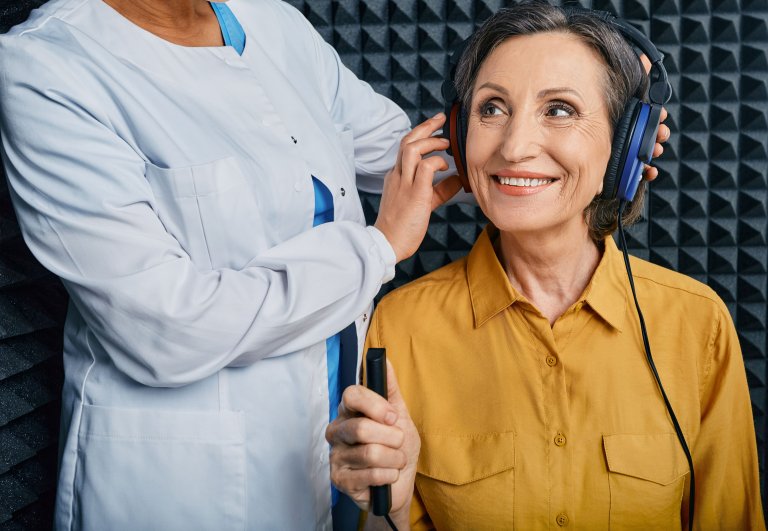An online hearing test typically takes around 5 minutes to complete. Online tests have limitations and cannot replace a full hearing assessment by a qualified hearing care professional. They should be viewed as an initial indication of your hearing abilities, not a comprehensive medical diagnosis.

Here’s how our simple online hearing test works:
For the most accurate results, it’s important to take the online hearing test in a quiet environment with no background noise. This will help ensure that you can clearly hear the different sounds played during the test. Use headphones or earphones rather than speakers – this allows us to test each ear individually.

During the setup, adjust your volume so that you can barely hear the tone. When the test starts, you’ll hear a series of tones at different pitches and volumes. Use the volume slider to adjust the sound level until you can just barely hear each tone. Go as low as you can while still detecting the faintest sounds.

Depending on the results of your online hearing test, you may need to book a free hearing test at your nearest The Hearing Care Partnership practice. Please note, if the test detects potential hearing loss or difficulties understanding speech in noise, we highly recommend following up with a professional audiologist.

Our experienced audiologists will conduct a thorough, full examination and provide personalised advice and treatment options, if needed.
Our online hearing test will provide a good indicator of your hearing health. To make it as accurate as possible, we recommend taking the test using headphones in a quiet setting. Of course, the online test won’t be able to give you a medical diagnosis but it’s a great guide to help you decide whether to book a full free hearing assessment with our expert audiologists, using the latest technology.
The first signs of hearing loss can be subtle, but here are some common indicators:
If you notice any of these signs, it’s a good idea to get your hearing evaluated by a professional. Early detection can help prevent further hearing loss and allow for timely treatment.
Are you noticing others speaking unclearly? Feel at times listening takes more effort? Accuse others of mumbling? Have music louder than you normally would? Missing key parts of conversations? Well, don’t worry, you’re not alone. According to the RNID, 40% of people over 50 suffer from some kind of hearing loss.
At THCP, we’re here to help. Take our online hearing test for a good indicator of your hearing health. Or book an appointment for a full and free assessment at your local practice.
Yes, tinnitus (ringing or buzzing in the ears) can potentially impact your ability to accurately perceive the sounds played during the online hearing test. If you experience tinnitus, it’s best to mention this when booking a free tinnitus assessment with one of our audiologists.
While online hearing tests can provide a general indication of your hearing abilities, they are not a substitute for a professional hearing evaluation. Online tests may not account for factors like background noise, headphone quality, or medical conditions that could affect your hearing. For an accurate diagnosis and personalised treatment recommendations, it’s essential to undergo a comprehensive hearing assessment with a qualified audiologist.